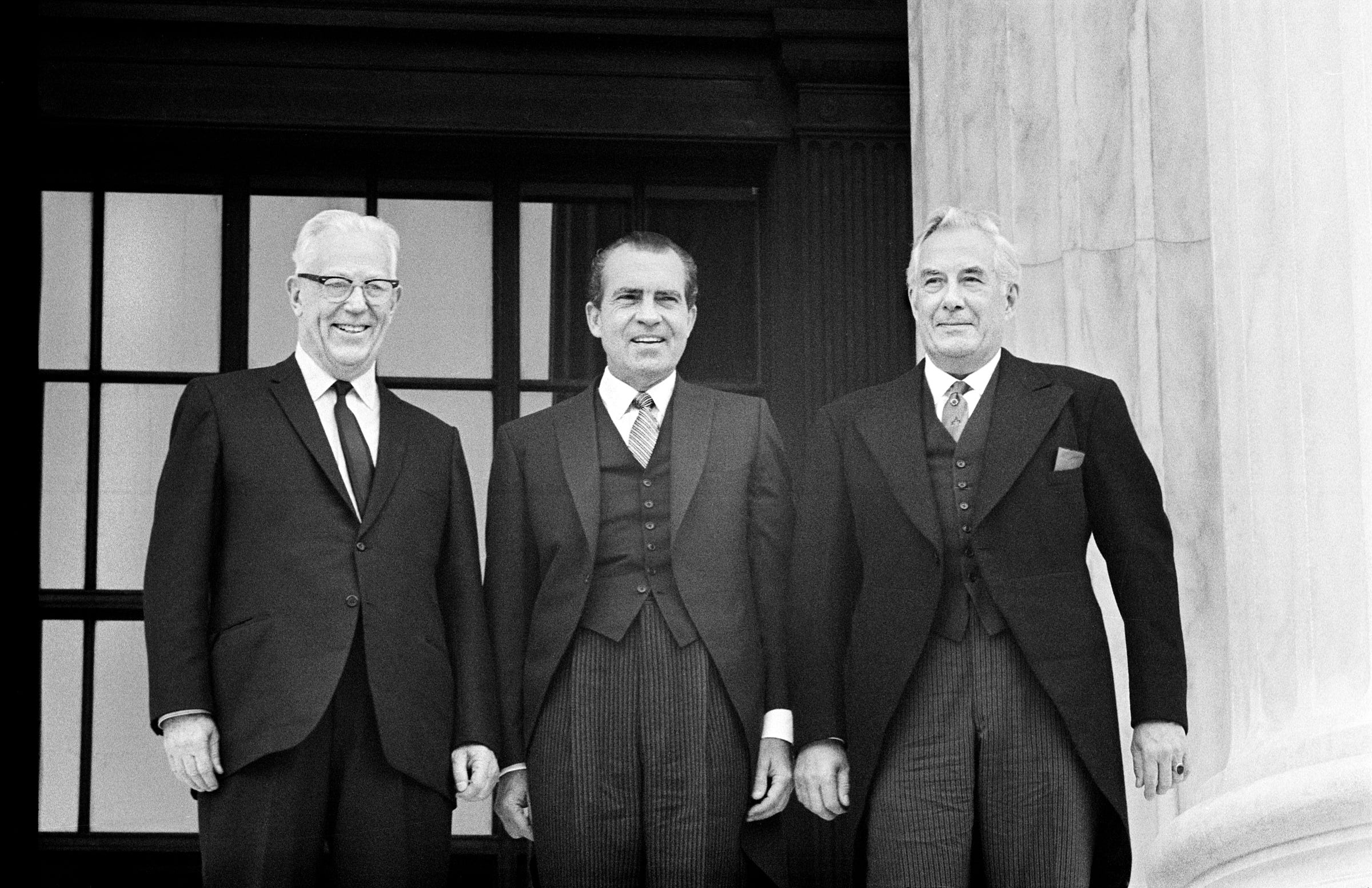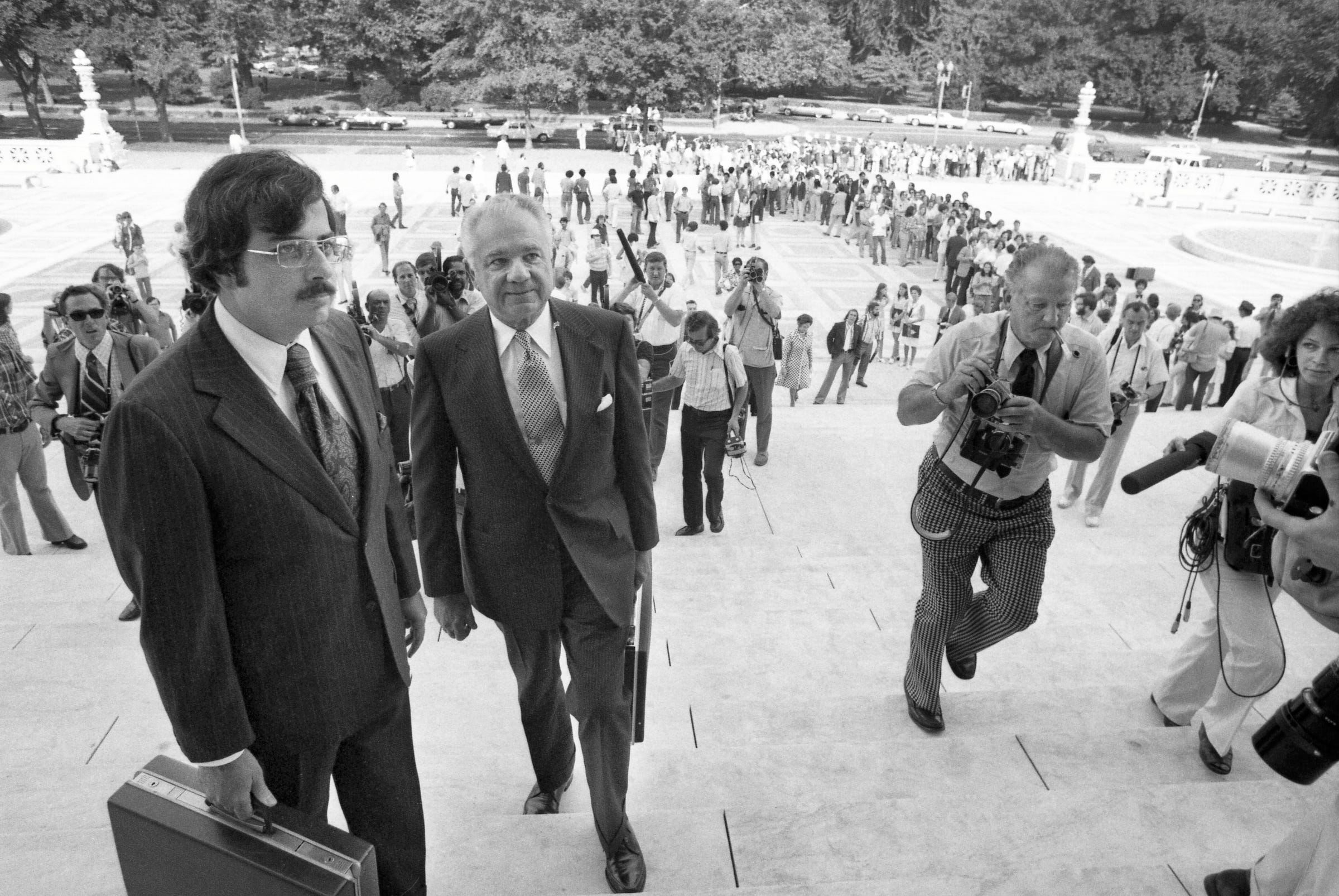
I Argued ‘U.S. v. Nixon.’ The Supreme Court’s New Ruling on Presidential Immunity Appalled Me.
Fifty years after ruling against a corrupt president, the Court has now decided that presidents are above the law.

WHAT A DIFFERENCE FIFTY YEARS MAKES: Half a century ago, a unanimous Supreme Court ruled that the president was subject to the laws of the United States that apply to every other citizen. But a week ago, a splintered Court voted 6–3 to create a unique prerogative for presidents to commit federal crimes with impunity.
Fifty years ago today, on July 8, 1974, I walked up the steps of the Supreme Court along with Special Prosecutor Leon Jaworski to present oral arguments. I remember feeling confident that Monday morning, arriving at the Court in my best blue suit, not the formal cutaway that government counsel normally wear before the Court; Jaworski, a Texas trial lawyer, told me that he would not be comfortable in a formal outfit. This was not my first case before the Court—I had previously been a deputy solicitor general—and I was once again arguing in the name of “the United States,” although this time in opposition to the president.

Jaworski and I argued that, even as president, Richard Nixon could be required to comply with the duty of every other citizen to produce material evidence—in that specific case, tape recordings made in the Oval Office—that would show whether serious federal crimes had been committed.
The issue in United States v. Richard Nixon was whether the president and his closest aides had conspired to obstruct justice in the Watergate break-in coverup.
Just sixteen days later, the Court concluded that, while Nixon could claim a limited privilege for some confidential communications, that privilege could be overcome by the overarching public interest in prosecuting federal crimes. Thus, the people of the United States, in whose name all federal criminal proceedings are brought, prevailed.
Nixon was ordered to produce the evidence, which showed his own complicity, as the grand jury had alleged in naming him an “unindicted co-conspirator.” He resigned two weeks later, still the only president to have done so.
Dramatically different in tone and content was last week’s decision in Donald Trump v. United States fabricating immunity for Trump from criminal liability to the people he and other presidents are sworn to serve.
First, there is a remarkable disparity in the justices’ approach to promoting public respect for the integrity of the Supreme Court as an institution.
Only eight justices sat in Nixon, because the most junior justice, William Rehnquist, concluded that his brief service as an assistant attorney general in the Nixon administration was sufficient to require his recusal. But in Trump, two of the six justices who made up the majority, Clarence Thomas and Samuel Alito, had the appearance of partisan support for Trump in connection with the very conduct before the Court. Under any honorable sense of judicial ethics, their conduct should have forced them to stand down.
In Nixon, the three other Nixon appointees (Chief Justice Warren Burger, Justice Harry Blackmun, and Justice Lewis Powell) joined in voting against the president. By contrast, all three of Trump’s appointees (Alito, Brett Kavanaugh, and Amy Coney Barrett) voted to immunize him from criminal culpability. Their votes were decisive in handing him this victory.
A decision of such monumental importance affecting the constitutional prerogatives of the president should command actual or virtual unanimity, if it is to be broadly accepted. During Watergate, Nixon had publicly declared that he might feel free to disregard an adverse decision, unless the Court spoke “definitively.” In my closing words, therefore, I urged the Court to uphold the order to Nixon “fully, explicitly, and decisively, and definitely.” The Court’s unanimous opinion left no room for Nixon to question the constitutional soundness of the ruling against him
We now know that all of the justices recognized the importance of speaking unanimously. Chief Justice Warren Burger was “inspired” by what his predecessor, Earl Warren, had been able to accomplish in achieving unanimity in Brown v. Board of Education, the landmark case condemning racial segregation. As Justice Harry Blackmun later explained, “all justices wanted to have a unanimous opinion but not at a cost of something that they felt strongly about.” There were some profound differences, but in a spirit of cooperation, “compromise was struck to get unanimity.”
By contrast, the pro-Trump majority was in no mood to compromise, insisting on handing Trump such a sweeping victory that even Justice Barrett could not bring herself to join in the part of the decision that prevents prosecutors from using “official” acts by a miscreant president in pursuing concededly prosecutable “private” crimes. The arrogant message of judicial realpolitik is clear: All we need is five votes to impose our view of the Constitution. Period.
Finally, the views of the presidency on the Burger Court and the Roberts Court could not be more different. One of Nixon’s key constitutional claims was that the Supreme Court had no business considering the special prosecutor’s demand for evidence from him, because a subordinate officer in the executive branch could not pursue proceedings against the will of the president.
The Court rejected that theory, noting that Congress had vested criminal law enforcement authority in the attorney general, whose appointees such as the special prosecutor may file charges “in the name of the United States as sovereign.” The president, although chief executive, may be required to give evidence in pending criminal cases brought on behalf of the country.
The Court refused to find that “separation of powers” allows a president to claim an “absolute privilege” against cooperating in a criminal case, because that position would conflict with “the primary constitutional duty of the Judicial Branch to do justice in criminal prosecutions.” Even a qualified privilege was found to be outweighed by “our historic commitment to the rule of law,” including “the twofold aim” of criminal justice “that guilt shall not escape or innocence suffer” (emphasis added).
The Trump majority has a startlingly different view of presidential supremacy. Several of the justices in the majority came of age under the influence of conservative ideas about the desirability of strengthening the presidency, including the “unitary executive” theory. As I knew from personal experience, Kavanaugh’s philosophical orientation made him an outspoken critic of the Nixon decision before he was nominated to the Court.
In Trump, the justices in the majority explained why they were inserting into the Constitution an idea that would not have been taken seriously by anyone up through the Watergate era, holding for the first time in American history that a president has a constitutional license to kill—among other federal crimes—in the course of performing his functions.
THE MAJORITY LAMELY PROTESTED that their decision to make Trump (and future presidents) immune from criminal laws does not mean that the president is “above the law,” a principle that almost all of them swore they accepted during their confirmation hearings. Nevertheless, they were willing to create this unique—and both dangerous and anti-constitutional—immunity from ordinary and universal criminal prohibitions, because in their view, “unlike anyone else, the President is a branch of government.”
According to the majority, the president is “the sole person charged by the Constitution with executing the laws of the United States.” From this sweeping—and facially unsound—proposition, it somehow follows that the president is privileged to violate all federal criminal laws, so long as there is some plausible connection to his “official” duties.
So much for the president’s constitutional mandate to “take Care that the Laws be faithfully executed.” Only by using Orwellian doublespeak could the Court’s conservative justices mangle the president’s principal constitutional duty by exempting him from it. The Nixon justices must be spinning in their graves.
















